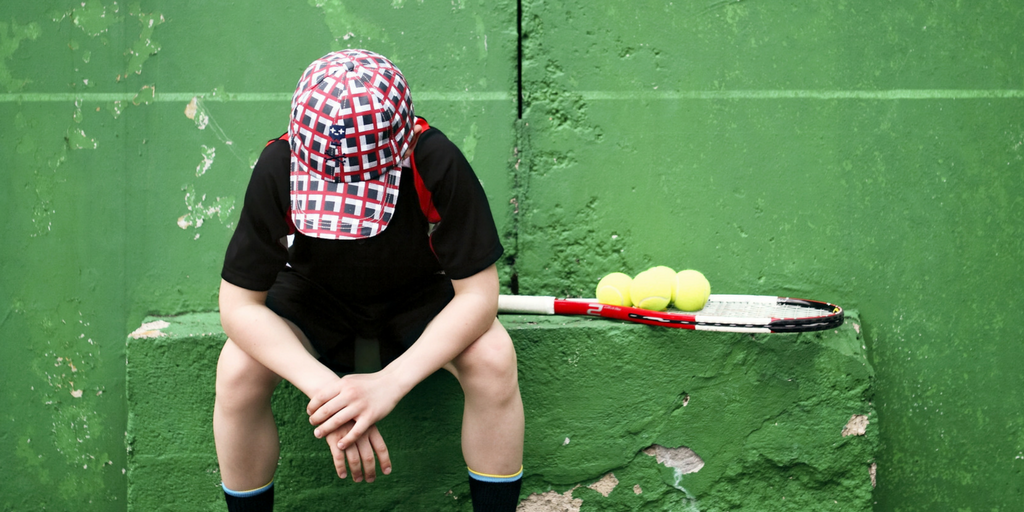Let’s call him Adam; all the identifying details here have been changed, but the story is real. The young man consistently ranked among the top 40 juniors in USTA national rankings. He was a very hard-working, competitive, and focused athlete. Adam decided at age 12 to play pro tennis, and at 15 told people he wasn’t going to college, as he would be playing on the ATP tour instead.
Soon enough, he decided that college ball was actually a good idea. As an older junior player, Adam learned that if he was losing a back-draw match and pulled out due to an “injury,” that did not affect his status as a recruit. One year, he pulled out of five consolation matches he was losing. The “injury” never kept Adam from practicing in the next day or two.
He enrolled at an Atlantic Coast Conference (ACC) college where, his first year, the school had a great shot at earning an automatic bid to the NCAAs at the ACC tournament. When Adam’s team lost at #2 doubles and he lost, 6-1, 6-1, at #4 singles, they barely made the finals. Unsurprisingly, his coach removed him from the lineup for the rest of the tournament as well as the NCAAs. The next year, the coach dropped him to #6 singles, where Adam had a mediocre record and did not play all matches. The coach recognized that whenever his team needed a point from Adam, he inevitably found a way to fail.
Adam transferred to a Big 10 college as a junior, where he had a good record playing for a poor team, with the pressure off. But in his senior year, the school collected three blue-chip recruits and a top foreign player; Adam quit varsity tennis.
Having gamed the system by ducking difficult opponents, Adam never outgrew that mindset. He failed to develop grit. Despite his status as a top-40 junior, Adam played fewer than 65 college matches and of course, never got even a whiff of a pro career.
Ducking tough competition has never been a way to build a champion. Many young players have “default-itis.” They withdraw from difficult matches they might lose in a misguided attempt to shield their precious rankings. Perhaps these players preserve their points, but they don’t build competitive strengths. Cultivating resilience by “gutting out” challenging matches develops the mental toughness to prevail against adversaries of greater and greater ability. That
does build champions. “Working” the system to keep ranking points turns out examples of the Texas epithet, “All hat, no cattle.” They have the points, but lack the tennis skill.

In tennis, you rise in rankings by garnering more points. On paper, all points are equal: a point is a point. But in reality, some points are very easy to earn, and others are very hard. Most likely, it’s easier to take home a bushel of points from a Uzbekistan Futures tournament than a Spanish Futures. To do so, though, you’ll need the financial resources to travel to Uzbekistan. To some extent, points are thus “for sale.” Those who worship at the altar of points are praying to a false god.
"The issue is that athletes, coaches, and teams treat different opponents differently,” says mental training coach Lindsey Wilson of
Positive Performance. “There is no game that is bigger than any other—one can easily lose to an inferior opponent because of a lack of focus or not taking it seriously. Competition is competition, which is an opportunity to challenge oneself."
“If you take away the challenges, you leave your kids ill-equipped to handle future challenges.”
In today’s world, the hovering “helicopter parents” are giving way to “snowplow parents” who seek to plow clear, open paths before their children. They ignore the maxim that you cannot help people permanently by doing for them what they can and should do for themselves. “If you take away the challenges,” says Harvard men’s coach Dave Fish, “you leave your kids ill-equipped to handle future challenges.” Indeed, snowplow parents may raise
teacup children, so protected from failure that they are fragile as teacups and crumble if they don’t get into a certain club or make the varsity team.
It is obstacles, and finding ways to surmount them, that build resilience and grit in young athletes, that make them seasoned competitors when the chips are down. “We’ve lost the joy of the arduous journey that bears real fruit down the line,” says Fish. “Do you want to bring out the full capabilities of your child, or just get something for nothing?” Even when you succeed, getting something for nothing (think lotteries and gambling casinos) rarely produces satisfying results. Satisfaction comes from earning success. That’s having the cattle as well as the hat.
In his classic book
The Inner Game of Tennis, Tim Gallwey nicely distilled the payoffs of competition. “Once one recognizes the value of having difficult obstacles to overcome, it is a simple matter to see the true benefit that can be gained from competitive sports,” he wrote. “In tennis, who is it that provides a person with the obstacles he needs in order to experience his highest limits?
"Once one recognizes the value of having difficult obstacles to overcome, it is a simple matter to see the true benefit that can be gained from competitive sports."
His opponent, of course! Then is your opponent a friend or an enemy? He is a friend to the extent that he does his best to make things difficult for you. Only by playing the role of your enemy does he become your true friend. Only by competing with you does he in fact cooperate! No one wants to stand around on the court waiting for the big wave. In this use of competition it is the duty of your opponent to create the greatest possible difficulties for you, just as it is yours to try to create obstacles for him. Only by doing this do you give each other the opportunity to find out to what heights each can rise.”
Do things the right way. Earn your place in the tennis world with the fair and accurate UTR system. Subscribe here.
This dad improvised a home-brew UTR before finding the real one. Read more in Chasing Excellence, Not Points.
 In tennis, you rise in rankings by garnering more points. On paper, all points are equal: a point is a point. But in reality, some points are very easy to earn, and others are very hard. Most likely, it’s easier to take home a bushel of points from a Uzbekistan Futures tournament than a Spanish Futures. To do so, though, you’ll need the financial resources to travel to Uzbekistan. To some extent, points are thus “for sale.” Those who worship at the altar of points are praying to a false god.
"The issue is that athletes, coaches, and teams treat different opponents differently,” says mental training coach Lindsey Wilson of Positive Performance. “There is no game that is bigger than any other—one can easily lose to an inferior opponent because of a lack of focus or not taking it seriously. Competition is competition, which is an opportunity to challenge oneself."
In tennis, you rise in rankings by garnering more points. On paper, all points are equal: a point is a point. But in reality, some points are very easy to earn, and others are very hard. Most likely, it’s easier to take home a bushel of points from a Uzbekistan Futures tournament than a Spanish Futures. To do so, though, you’ll need the financial resources to travel to Uzbekistan. To some extent, points are thus “for sale.” Those who worship at the altar of points are praying to a false god.
"The issue is that athletes, coaches, and teams treat different opponents differently,” says mental training coach Lindsey Wilson of Positive Performance. “There is no game that is bigger than any other—one can easily lose to an inferior opponent because of a lack of focus or not taking it seriously. Competition is competition, which is an opportunity to challenge oneself."


